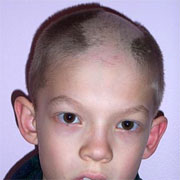Dr Rassman, like many others, I keep an eye on my head every day, not liking what I see. I’ve already been on propecia for a couple of yrs, seemingly with no significant benefits. This has lead to explore other options, theories etc. That being said, I would really appreciate your thoughts on 3 things and whether they earn a spot on the list of possible contributors to hair loss. They would obviously be an aside to the most common ones ie genetic, infection related, stress
1. The first is not drinking enough water, because generally speaking there are a number of ramifications for not doing so.
2. Second one is, benefits from using a boar bristle brush with the theory being: “The other excellent feature of a boar bristle brush is the massaging effect. The hard bristles stimulate the scalp, increasing the blood flow which can be very relaxing and soothing. The stimulation of the scalp also spreads the natural oils of the scalp – the sebum through the hair and down the hair shaft. This results in smoother, healthier hair that is soft and manageable. Increasing the blood flow to the scalp has been linked to stimulating hair growth, creating thicker and longer hair as well.”
3. And last, possible benefits from “supplements” such as drinking wheatgrass or matcha based drinks, both of which seemingly have a number of overall health benefits.
Thanks very much in advance for your time and valuable input!

We have said many times that genetic hair loss is not a curable or completely reversible process. It is what you are born with. Drugs such as Propecia (finasteride) work, but in the long run your genes will catch up. I’m not sure what benefits you’re looking for from Propecia. Are you merely looking for regrowth? Or have you seen continued loss at the same pace?
- Drinking water and hydration have nothing to do with hair loss.
- Massaging the head with brushes do not impact hair loss (either positive or negative). Blood flow is not the issue. Your hair follicles are programmed to die due to their inherent genetic programming tied to a particular number of hair cycles.
- I realize supplements are a big thing in our society, but it really does not impact the hair in my opinion.
Sorry for the negativity, but it is how I see it. Everyone is free to try their own remedies in hopes of stumbling on the cure.


 Pop a Tylenol and take a brisk walk for protection against prostate cancer? That’s what the findings of two new studies published this week suggest.
Pop a Tylenol and take a brisk walk for protection against prostate cancer? That’s what the findings of two new studies published this week suggest. Hair loss is a common problem that can be caused by a variety of conditions.
Hair loss is a common problem that can be caused by a variety of conditions.